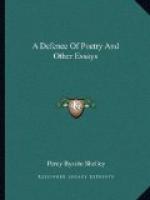and enlarged by a sympathy with such great and lovely
impersonations, until from admiring they imitated,
and from imitation they identified themselves with
the objects of their admiration. Nor let it be
objected, that these characters are remote from moral
perfection, and that they can by no means be considered
as edifying patterns for general imitation. Every
epoch, under names more or less specious, has deified
its peculiar errors; Revenge is the naked idol of
the worship of a semi-barbarous age; and Self-deceit
is the veiled image of unknown evil, before which luxury
and satiety lie prostrate. But a poet considers
the vices of his contemporaries as a temporary dress
in which his creations must be arrayed, and which
cover without concealing the eternal proportions of
their beauty. An epic or dramatic personage is
understood to wear them around his soul, as he may
the ancient armour or the modern uniform around his
body; whilst it is easy to conceive a dress more graceful
than either. The beauty of the internal nature
cannot be so far concealed by its accidental vesture,
but that the spirit of its form shall communicate
itself to the very disguise, and indicate the shape
it hides from the manner in which it is worn.
A majestic form and graceful motions will express
themselves through the most barbarous and tasteless
costume. Few poets of the highest class have
chosen to exhibit the beauty of their conceptions in
its naked truth and splendour; and it is doubtful
whether the alloy of costume, habit, &c., be not necessary
to temper this planetary music for mortal ears.
The whole objection, however, of the immorality of
poetry rests upon a misconception of the manner in
which poetry acts to produce the moral improvement
of man. Ethical science arranges the elements
which poetry has created, and propounds schemes and
proposes examples of civil and domestic life:
nor is it for want of admirable doctrines that men
hate, and despise, and censure, and deceive, and subjugate
one another. But poetry acts in another and diviner
manner. It awakens and enlarges the mind itself
by rendering it the receptacle of a thousand unapprehended
combinations of thought. Poetry lifts the veil
from the hidden beauty of the world, and makes familiar
objects be as if they were not familiar; it reproduces
all that it represents, and the impersonations clothed
in its Elysian light stand thenceforward in the minds
of those who have once contemplated them as memorials
of that gentle and exalted content which extends itself
over all thoughts and actions with which it coexists.
The great secret of morals is love; or a going out
of our own nature, and an identification of ourselves
with the beautiful which exists in thought, action,
or person, not our own. A man, to be greatly
good, must imagine intensely and comprehensively; he
must put himself in the place of another and of many
others; the pains and pleasures of his species must
become his own. The great instrument of moral




